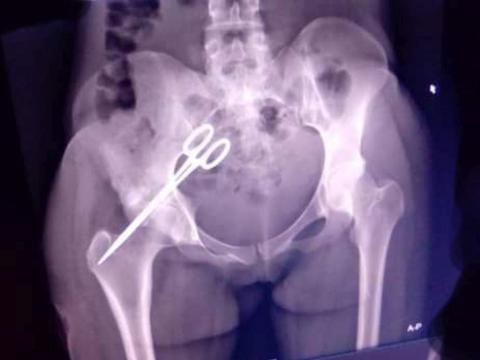By Mabinty M. Kamara
Women’s rights campaigners have called for action over the death of Zainab Kamara. The 28-year-old died on the 7 December 2021 after she had undergone a surgery on the 21 October to remove a pair of forceps (scissors) lodged in her abdomen for seven years. The operation took place at the Massanga Hospital in Tonkolili district, northern Sierra Leone.
Local doctors at the Port Loko Government Hospital in 2014 conducted a cesarean operation on Zainab during which she lost her baby. However, during the procedure the medical team left the scissors in her abdomen, which went undetected for seven years. Because of this, Zainab had difficulty moving her right leg and endured persistent bleeding which brought her discomfort and stigmatization among her peers and her ex-husband. She only knew she had the instrument in her abdomen at the Kambia Government hospital, after a pelvic x-ray was carried out this year.
Since Politico first broke the story seven months ago, not a single statement was issued by the Medical and Dental Association of Sierra Leone or officials in the Ministry of Health and Sanitation despite bringing it to their attention. Doctors who are quick to agitate for issues related to their members remained shockingly silent over what many consider a gross ineptitude by the surgeon(s) who operated on Zainab. Activists called the bungled 2014 surgery to be investigated and actoon taken. They have all hitherto fallen on deaf ears.
Makalay Sonda, women and girls rights campaigner described the death of the 28-year-old as “unfortunate and unforgiving”, noting that teachers were paraded at the famous cotton tree in Freetown for corruption allegations, but that the doctors that caused the early demise of Zainab are sleeping soundly and enjoying.
“No investigations. Imagine how many may have died because of deadly mistakes, negligence I should say in the theatres and wards of our hospitals. Our health system in this country is killing us. If a place of cure, solace, and hope turns into a deadly dungeon, then what do we do?” she said while calling for justice to be served to the lady by bringing the doctor(s) responsible to book.
However, Ishiaka Kamara, elder brother to Zainab, told Politico that no effort could bring them the much-needed justice for the death of their sister apparently caused by systemic negligence. He said his sister suffered a lot before her demise and that even in death she had to be buried away from her hometown of Kambia because they could not afford to hire a vehicle to convey her body since the hospital could not provide an ambulance service.
“We are Muslims and so we believe in God for the ultimate justice. We do not have money and cannot fight the powerful, so we are leaving everything to God for His final judgment. If it’s the right thing they did to her then let God hold them to account for their actions,” he said.
But Femi Coker, President of Women in the Media Sierra Leone (WIMSAL) said that as a women's rights group, WIMSAL was not going to relent on the call for justice. She added that it would help save many other people from such grave errors that have led them to their early graves.
“The authorities have failed not only Zainab but the rest of Sierra Leoneans who depend on the public health system for a cure. We all know that mistakes can occur in any profession including ours (journalism) but one has to be ready and willing to take responsibility for whatever damage your actions may cause,” she said.
She added, “the doctors have refused to own up and the authorities also do not want to take action. But we will not relent. We will continue to call for justice until they hear our voices in the news and read our stories in the papers.”
A woman in Guyana had scissors lodged in her abdomen for 10 years after an operation following a violent robbery attack in 1990. The error was detected in the year 2000. Though she refused to have the instrument removed, having suffered mental problems and calling for a $10 million compensation, the President of the Guyana Medical Association at the time, Dr. Max Hannoman looked up her X-ray report and took the woman’s case seriously.
Another 29-year-old woman had to return for another surgery following persistent complaints of abdominal pain. The scissors discovered were swiftly removed ten days after the first surgery. Both incidents greatly embarrassed medics in the Caribbean nation.
Politico could not get the management of Massanga Hospital to respond to inquiries, but it is incontrovertible that Zainab never got the attention she needed and deserved.
Copyright © Politico Online 10/12/21








